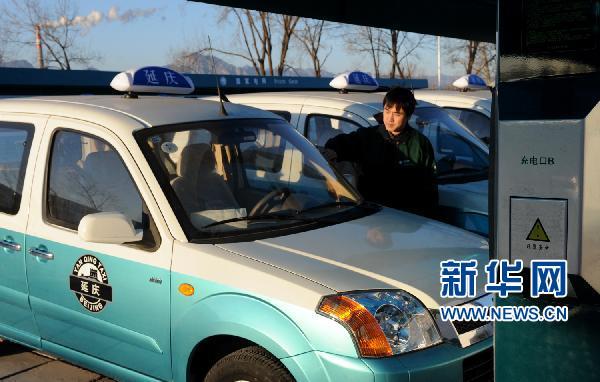| Videos | ? Latest |
|
? Feature | ? Sports | ? Your Videos |
Electric taxis in Beijing

 0 Comment(s)
0 Comment(s) Print
Print E-mail
CNTV, November 28, 2011
E-mail
CNTV, November 28, 2011
Beijing municipal government is to add another 100 electric taxis next year to its existing fleet of 50. The pilot operation of the service was launched in March in the suburbs. CCTV Reporter Li Nan has the story.
 |
|
Beijing municipal government is to add another 100 electric taxis next year to its existing fleet of 50. |
Wang Lijun is a taxi driver in Yanqing County of Beijing. He is one of the fifty drivers equipped with electric cars in the county's pilot trial. The program, the largest of its kind in Northern China, was launched in March.
Wang Lijun, Taxi Driver of Yanqing Electric Taxi Program, said, "I've been driving the electric taxi for more than half a year now. The experience is pleasant. The vehicle is actually easier to control than normal cars because you don't have to change gears while driving."
The taxi, produced by Foton Motors, is powered by electricity rather than gasoline, so there are no emissions and it does not need tailpipes. To attract more passengers, the starting price for each ride is set at 5 yuan, half the price of a traditional taxi.
Local Passenger said, "The electric taxis are cheaper. I feel quieter and more comfortable than taking normal cars. And it is environmentally friendly.
Beijing expects to increase the number of electric taxies in Yanqing to 150 units by May next year, and even to launch similar programs in other suburban counties. Meanwhile, to encourage personal buyers, a series of favorable policies have been published. In Beijing, electric car owners can skip the current purchase restriction and get a number plate straight away. And they will also receive subsidies from the central government.
Zhao Jingguang, Party Secretary of Foton Motors, said, "The government is providing great support on new energy vehicles including subsidies and other benefiting policies. The industry is still at a starting stage, so the support is important and will continue."
However, there are still challenges to overcome before electric cars can attract more enthusiasts. Most manufacturers are facing technology difficuties. For example, it takes around eight hours for Foton's electric taxi to be fully charged, but it can only travel 150 kilometers at most in the summer and even shorter distances in the winter before the battery runs out.
Currently there is only one charging station in Yanqing. So the electric taxis can only operate within a very small area. Although large cities like Beijing, Shanghai and Shenzhen have all made ambitious plans to build more charging stations, there has to be a complete network of charging facilities thoughout China so that electric vehicles can replace traditional cars for private users.





